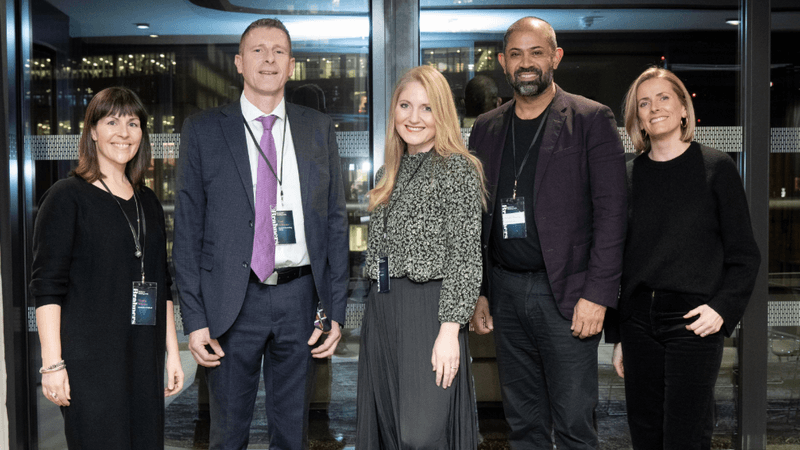2026 horizon scan — key legal & regulatory changes ahead

We explore the key developments that in-house lawyers should have on their radar and what they mean for your organisation in the year ahead.
Read more
We make the difference. Talk to us: 0333 004 4488 | hello@brabners.com
AuthorsJennie Jones
10 min read

Nicola Whyley, Paul Gibbons, Jennie Jones, Ikram Malik and Michele Steel at the Building Links event at Brabners.
With the Government’s ambitious plans including building 1.5m houses, the UK construction industry needs to attract approximately 250,000 additional workers by 2028 to meet demand.
Construction professionals, business leaders and academics joined us at our recent Building Links event to discuss this pressing challenge and explore actionable solutions.
We had the privilege of hosting an esteemed panel of speakers including:
Here, Jennie Jones in our construction team explores the key factors responsible for the construction skills gap and what industry leaders could do to take action and meet growing demand.
Throughout the discussion, the following were identified as the key reasons for the skills shortage:
The CITB estimates that around 252,000 workers will be needed in the construction industry over the period 2024 to 2028.
In July 2024, the Quarterly Recruitment Outlook (QRO) — a survey of more than 4,700 UK firms of all sectors and sizes by the British Chambers of Commerce (BCC) Insights Unit — revealed that while hiring problems increased across all sectors, construction and engineering firms were the worst hit. With 82% of construction and engineering firms reporting recruitment difficulties against a significant increase in demand, UK construction productivity and growth has lagged behind.
A decline in the number of apprentices entering the construction sector, an aging workforce and a surge in investment have all been identified as factors contributing to the widening skills gap. For example, according to the Financial Times, only 713,000 people were registered as apprentices in 2021 — the lowest annual total since 2020 — and almost half didn’t complete their course.
Plus, more than 35% of construction workers are aged over 50, with the UK Trade Skills Index 2023 reporting that the construction industry would need 937,000 new recruits over the next decade to meet demand.
When it comes to attracting new talent, our speakers highlighted that only 15% of construction workers are women and only 6% are from an ethnic minority background. Paul Gibbons, CEO of Decipher said: “As an industry, we should be tapping into a more diverse workforce… employers will need to demonstrate a commitment to diversity and inclusion in order to attract underrepresented workers.”
Another factor that could put off new recruits is the construction industry’s struggles to invest in skills and innovation, identified in a recent report by Skills England, which is largely due to its highly cyclical and unpredictable profit margins. With so much sub-contracting and self-employment in the construction industry, there has been little incentive for employers to invest in training for on-site workers.
As part of its election manifesto, the new Labour Government made ambitious pledges to invest in construction. While investment has generally been welcomed by the industry, it risks increasing the current gap between supply and demand for skilled construction workers.
In the Autumn Budget, the Chancellor reinforced the Government’s intention to progress key initiatives including:
Building 1.5m homes over this Parliament — along with the new infrastructure that this will demand. This is a large increase on current construction and housing output, which will require an expansion and upskilling of the UK’s construction workforce.
National Wealth Fund — The Government also plans to drive private investment in construction through its new National Wealth Fund, which it hopes will attract £3 of private investment for every £1 of public investment. The Labour manifesto suggests that these funds will be allocated as follows:
Green Prosperity plan — Labour’s manifesto intends to double onshore wind energy production, triple solar power and quadruple offshore wind by 2030, with £8.3bn worth of investment in Great British Energy. The latest Budget confirmed £125m for Great British Energy and support for four electrolytic hydrogen projects, requiring specialist skills from the industry.
All of these projects will be hard to meet unless the current skills shortage is resolved.
Many in the sector are disappointed that the skills gap was not addressed in the Autumn Budget, particularly given the ambitious plans for investment in construction projects.
Despite the notable silence in the Budget, we do know that the Government is alive to the issue and plans to tackle skill shortages by:
Commenting on the Skills England initiative, our panellists agreed that any steps made towards plugging the skills gap are welcome, but that progress has been slow and warned that the initiative needs to translate into engagement from company boardrooms to make any meaningful impact.
Beyond support from government initiatives, our panel discussed the practical steps that organisations, educators, and policymakers can take to bridge the gap. Suggestions included investing in learning programs, strengthening apprenticeship pathways and fostering closer collaboration between businesses and education providers.
One practical step businesses can take is to consider becoming a STEM ambassador. As a STEM ambassador himself, Paul Gibbons urged those in the industry to consider becoming an ambassador to inspire and support the future of the sector. The STEM ambassador programme is a volunteering programme which connects positive role models working in science, technology, engineering and mathematics (STEM) with young people. An ambassador is asked to share real-life examples of working in STEM with students in schools and universities.
Nicola Whyley, Senior Philanthropy Manager at the University of Salford referred to the various initiatives that the university runs to inform students of potential career pathways — including lectures delivered by industry insiders, mentoring schemes to connect alumni with current students, and industry-funded scholarships. Nicola said: “Strengthening connections between current university students and the alumni network has helped to really unlock opportunities within the industry and promote widening participation.”
There was a general consensus among our speakers that young people are unaware of the interesting and varied career pathways available in the construction industry. Michele Steel of Regeneration Brainery suggested that the industry doesn’t benefit from the same exposure in popular culture as other sectors such as big business or law. Speakers highlighted that more visible role models for young people at all levels would help to attract talent, and the need for construction businesses to host insight events, provide shadowing opportunities and have an online presence aimed at Gen Z.
Discussions also covered the need to improve diversity in the construction workforce to broaden the knowledge, experience and skills that the industry can call upon. For Michele Steel, the argument for improving diversity was multi-faceted:
The panel also discussed the suggestion of businesses obtaining sponsorship licences for non-settled workers to provide access to a wider market of skilled professionals to fill immediate labour gaps.
By obtaining a sponsorship licence, businesses can draw from a wider pool of applicants, improve staff retention and reduce recruitment costs. This alone will not be enough to resolve the shortage but could provide some short-term relief to employers whose resources currently cannot meet demand. Ikram Malik, Partner and Head of Business Immigration at Brabners said: “Obtaining a sponsorship licence for your business can be a relatively quick, inexpensive and straightforward process, opening the door to new recruitment opportunities.”
Attendees left the event with a deeper understanding of the skills gap and actionable insights to address it within their own organisations, including;
Our Building Links network provides a platform to collaborate and share best practice and we are committed to starting meaningful conversations that drive positive change for businesses and communities — including how we bridge the skills gap and build the workforce of tomorrow.
Our Building Links events take place quarterly and aim to build connections, drive innovation and share knowledge throughout the industry.
Upcoming events in 2025 include:
Further details of our events will follow shortly. If you would like to be added to our Building Links network, please get in touch with Jennie.Jones@brabners.com.
If you’d like to discuss how any of these issues will impact your business, our experienced construction law team can help.
Talk to us by giving us a call, sending us an email or completing our contact form below.
Loading form...

We explore the key developments that in-house lawyers should have on their radar and what they mean for your organisation in the year ahead.
Read more

We break down the Employment Rights Bill (ERB) — what’s changing, when it’s happening and how you can prepare.
Read more

We provide an overview of key construction law cases from 2025 and explore the practical implications and emerging trends that are shaping the industry.
Read more